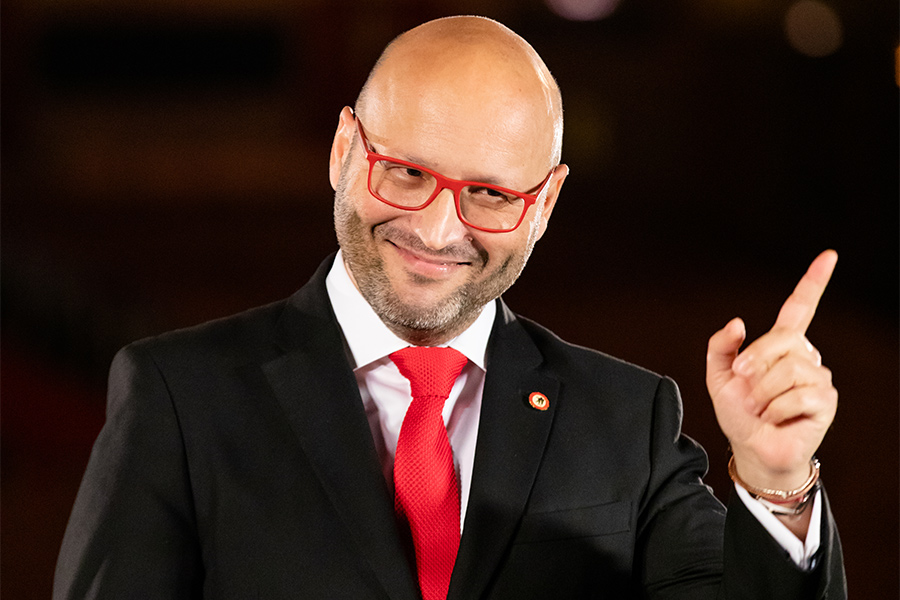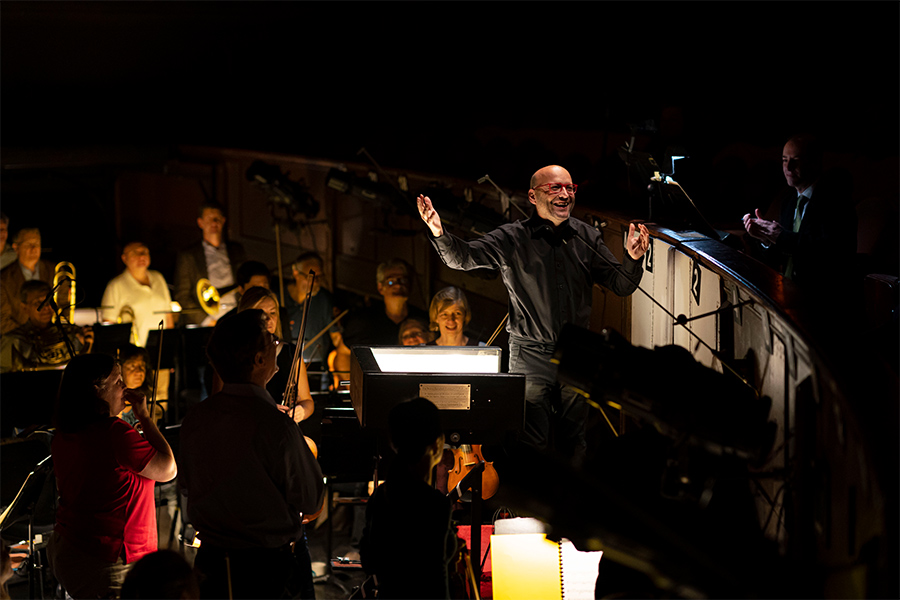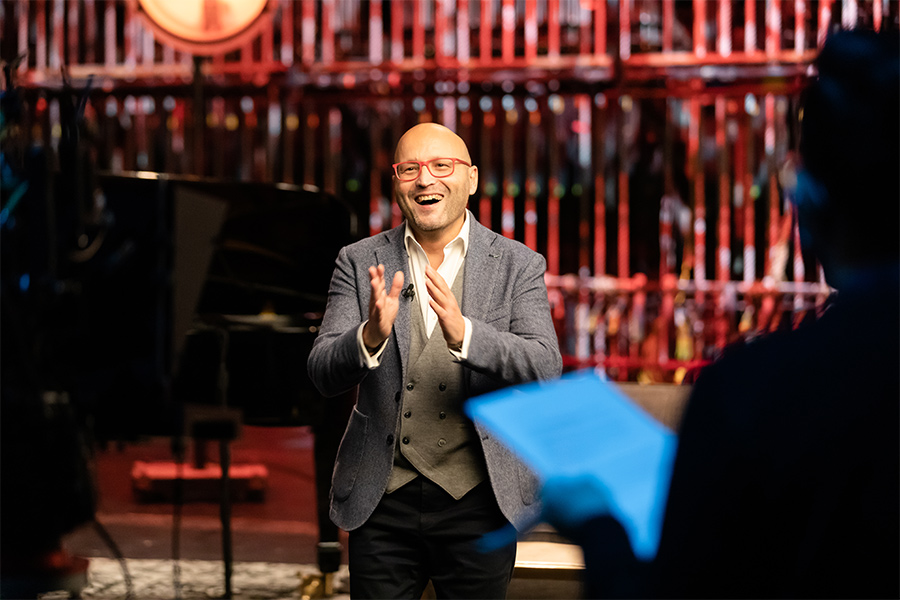September 12, 2021
A new era at Lyric Opera of Chicago: An interview with new Music Director Enrique Mazzola
Enrique Mazzola became Music Director of Lyric Opera of Chicago as of July 1, 2021. The Spanish-born, Italian-trained conductor is only the third person in Lyric’s 67-year history to serve in this capacity, following the tenures of Sir Andrew Davis and the late Bruno Bartoletti.
Mazzola first came to the attention of Lyric audiences when he led performances of Donizetti’s Lucia di Lammermoor during the 2016/17 season and Bellini’s I puritani in 2017/18. The bel canto specialist also launched the company’s Early Verdi Series in 2019/20 with Luisa Miller. Mazzola’s first opera as Lyric Music Director is Verdi’s Macbeth, brought to the stage in a new production by Director Sir David McVicar. This season, Mazzola also conducts Donizetti’s The Elixir of Love.
Mazzola was born into a musical family and studied violin and piano from an early age. Following his family’s move from his native Barcelona to Milan, he sang in the children’s chorus of La Scala, where his father worked as a répétiteur. Mazzola credits his early immersion in the daily life of Italy’s foremost opera house for instilling in him a deep love of opera, and for making him un uomo di teatro: “a man of the theater.” He holds diplomas in composition and orchestral conducting from the Giuseppe Verdi Conservatory, and credits legendary La Scala maestros Claudio Abbado and Carlos Kleiber for inspiring him to pursue a career on the podium. Mazzola is now one of the most sought-after operatic and symphonic conductors of his generation, and has held major posts in France, Germany, Italy, and now, Chicago.

Enrique Mazzola during the filming of Attila: Highlights in Concert in Lyric’s 2020/21 Season.
How does it feel to be an official member of the Lyric Opera family?
There are a very big number of different emotions. I am so proud to be at Lyric Opera. I am happy to be engaged with Chicago and this great opera house. Actually, I felt I was already actively engaged with Lyric and the city last season when, because the ongoing pandemic prevented us from giving live performances, I created four different filmed streaming programs. Each was dedicated to a different artistic force: our Orchestra, our Chorus, The Patrick G. and Shirley W. Ryan Opera Center, and, so as not to lose an important part of our cycle of early Verdi operas, a web series focused on the dozen musical numbers of Attila.
Your predecessor, Sir Andrew Davis, left you with an opera orchestra that is, by general content, playing at the top of its game. Tell us something about the relationship you’ve already built with the orchestra, and also, for that matter, the incomparable Lyric Opera Chorus.
I have a fantastic group of great colleagues, both in the Orchestra and Chorus, which makes me very happy! In a way, the difference between me and other conductors is that I have a very specific way of searching for the musical truth that lies within the score. The Orchestra’s players know that my approach is very true and honest, but also direct, and not subject to the “old rules” of [interpreting the Italian repertoire]. I am a revolutionary in the sense that I am committed to bringing out what’s really in the score, not just merely recreating [spurious] performance practices that have come down to us from recordings and throughout the last century. The Chorus knows I am very demanding about searching out and communicating the meaning of the words, especially in Verdi; in one rehearsal, I spent an hour and a half focusing solely on the text. This is not what an “antique-tradition conductor” does! Sometimes, traditions that arose later in the nineteenth century and into the verismo era can contaminate a “pure” reading of Italian Romantic opera.

Maestro Mazzola in the pit with the Lyric Opera Orchestra for the dress rehearsal of Verdi’s Luisa Miller in Lyric’s 2019/20 Season.
Macbeth was pivotal in Verdi’s development as a composer for the stage. The new production you are doing here with Sir David McVicar, based on the revised version Verdi prepared for the Paris Opera in 1865, will be given note- complete, with the exception of the ballet music. How do you assess the opera from a musical and dramatic standpoint?
Opera-goers sometimes forget that a big part of the 1865 Macbeth is actually early Verdi. The revised music accounts for maybe 40 percent of the opera, but the remaining 60 percent is from the 1847 original. Two years separate the composition of the original version of Macbeth and Luisa Miller (1849), and those were crucial years in Verdi’s stylistic development. The 1847 Macbeth sounds more modern and challenging than Luisa Miller. I’m sure the spectral, fearful atmosphere of Macbeth fired Verdi’s deepest imagination. Already in 1847 he was using compositional devices, such as chromatic scales, that were more advanced than anything else he was writing during that period. Listen, for example, to how he uses the piccolo and clarinet in their lowest registers to create a dark and scary effect. Verdi’s orchestral writing speaks directly to the audience, whether it’s conveying horror, terror, victory, or vengeance.
Macbeth has been called a “conductor’s opera,” as opposed to a “singer’s opera.” Do you subscribe to that view?
No. I don’t think there are “conductor’s operas.” I’m absolutely convinced that the role of the conductor is a role inside a larger artistic team, and that’s the way I work with my singers, orchestra, and chorus, as well as collaborating in close partnership with the director and the production team.
Is Lyric’s new Macbeth your first collaboration with Sir David McVicar?
Yes. We have met many times over dinner at Glyndebourne, but have never worked together before now. He has prepared a fantastic Macbeth for us; the familiar story is seen from different angles. There is no better director than David [who was born in Glasgow, Scotland] to recreate the strange, sometimes terrifying Scottish world of Shakespeare, as filtered through the genius of Verdi.

Enrique Mazzola, on set during the filming of Sole e Amore, part of Lyric’s 2020/21 virtual season.
Have you found a permanent residence yet in Chicago, or are you still living out of suitcases?
No more suitcases, please! One of the first things I did after being named Music Director was make Chicago my new home—my new city. When I was Artistic and Music Director of the Orchestre national d’Île-de-France in Paris, I moved there immediately. I’m convinced that being a music director is not only about the artistic role, but also about absorbing all the influences, feelings, and information that come from the city in which one is based. I feel as if Chicago is already my home. The Lyric Opera House is a half-hour walk from where I live. I’ve started taking CTA buses. I’m very European, and Europeans always use public transportation.
I like living in the city. I also like that the Lyric Opera House is open to everybody. We at Lyric Opera want to offer our art to everyone. This is really my big cultural mission.
John von Rhein retired from the Chicago Tribune in July 2018 after more than 40 years as its music critic. He continues to write about classical music on a freelance basis.
September 17 – October 9, 2021
Macbeth
Macbeth
Lyric’s riveting season opener is the inaugural production of Music Director Enrique Mazzola's tenure, and a brand-new production from Sir David McVicar. Adapting one of the greatest tragedies written by his hero, Shakespeare, Verdi created a stunning portrait of the most power-hungry couple who ever trod a stage. Macbeth’s bloody ascent to the throne of Scotland — led and supported by his wife’s own consuming ambition — results in disaster for them both. Verdi brings them to blazing life in a score that bristles with energy and endless excitement. Grand-scale arias, hair-raising duets, stupendous ensembles — they’re all here, in the first genuine masterpiece of Verdi’s career.

